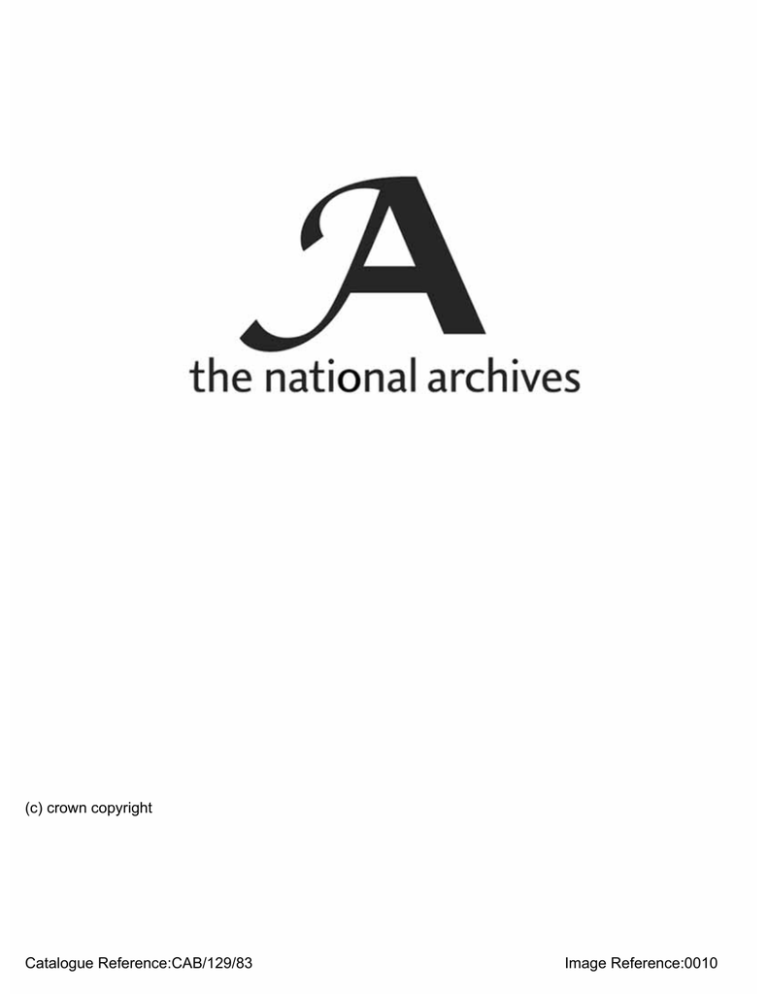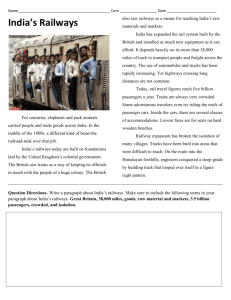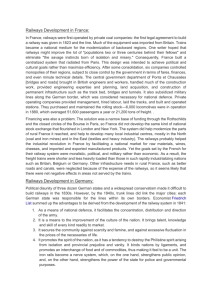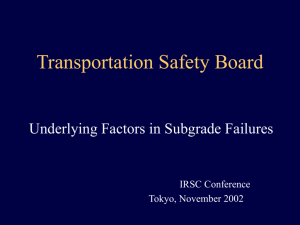(c) crown copyright Catalogue Reference:CAB/129/83 Image Reference:0010
advertisement

(c) crown copyright Catalogue Reference:CAB/129/83 Image Reference:0010 Printed for the Cabinet. September 1956 SECRET Copy No. CP. (56) 210 20th September, 1956 CABINET THE BRITISH TRANSPORT COMMISSION N O T E BY THE LORD CHANCELLOR At their meeting on 12th June, the Cabinet appointed a Committee under my Chairmanship to consider what practical proposals for increasing the efficiency of the railways could with advantage be included in a White Paper on lines suggested by the Minister of Transport and Civil Aviation (CM. (56) 41st Conclusions, Minute 2). 2. The British Transport Commission are responsible for the management of the railways and my Committee consider it important that any plan for increasing the efficiency of the railways should bear the stamp of the Commission^ initiative and authorship. This view is fully shared by the Chairman of the Commission. My Committee therefore recommend that the White Paper should be in two parts; the one containing the Commission^ own proposals and the other the Governments conclusions on them. 3. I am asking the Minister of Transport to circulate separately the memorandum which the Commission have prepared. This document, while reviewing the financial situation of the Commission^ undertaking as a whole, concentrates on the railways, describing their vital role in the nation's transport system and the Commission^ programmes for refashioning equipment and practice so as to assure their future profitability. The memorandum is necessarily long and detailed and few of my colleagues may be able to undertake the considerable labour of reading it. Those who are, however, able to look through it will, I think, agree that the Commission have produced a creditable and readable document which meets many of the criticisms now aimed at them. Its frank and informative exposition of their position and prospects and the detail of the future programmes should, moreover, help to dispose of the suggestion that an independent inquiry is necessary to establish the facts about the railways. 4. The main conclusion of the Commission^ memorandum is that, whilst their ultimate position will be one of considerable strength, the benefits from their proposals will accrue only on the long term and that during the next five or six years they will continue to incur substantial deficits which they will be unable to finance under existing arrangements. The Minister of Transport and the Financial Secretary to the Treasury have in consultation with the Commission prepared a scheme for the provision for a limited period of facilities for special loans which the Commission should ultimately be in a position to repay. 5. I am circulating with this note a draft of the Governmenfs part of the proposed White Paper which my Committee have agreed, subject to any minor drafting amendments which may prove desirable and to the settlement of the precise wording in which the points in paragraph 27 should be presented. This draft describes in its final paragraphs the Governmenfs conclusions and their 50540 proposals for dealing with the situation. These proposals appear to be about the best that can be devised without exposing the Government to the criticism that they are commending a subsidy. Their introduction will require legislation: but it is now clear that early legislation in some form will be necessary because the Commission^ powers to borrow to cover their current deficits are inadequate. 6. The draft White Paper also describes, as background to the financial proposals, the extent to which the Commission^ current difficulties are not of their own making and what the Government has already done to improve the Commission^ structure and give them the kind of organisation that will enable them to survive in present-day conditions of competition. The draft, while not committing the Government to the actual scale of investment indicated by the Commission for future years, expresses the Governments approval of the general lines of the Commission^ proposals. This measure of support seems necessary if the Government are to justify the exceptional financial measures proposed. 7. The authority of my colleagues is now sought to the publication of this White Paper, including the Transport Commission^ memorandum in the form of an annex, before the end of the present session of Parliament and to the drafting of the necessary short Bill with a view to its introduction early in the new session. If these proposals are acceptable to my colleagues, I suggest that the Government^ intentions to introduce this legislation could appropriately be made known in the Gracious Speech on the opening of the new Parliament. K. House of Lords, S.W. 1, 20th September, 1956. SECRET D R A F T THE BRITISH TRANSPORT COMMISSION THE BRITISH TRANSPORT COMMISSION REVISED DRAFT OF THE WHITE PAPER Introduction 1. In a statement to the House of Commons on 19th March, 1956,* referring to an application made to him by the British Transport Commission on 21st February for his approval to a general increase in freight charges, the Minister of Transport and Civil Aviation made it plain that, as an essential part of the decisions then taken by the Government and the Commission, a reassessment of the economic and financial future of the Commission would be undertaken during the ensuing six months. 2. In pursuance of that arrangement the Commission, in reviewing their present and future operations, have prepared and submitted to the Government a comprehensive statement, which is annexed, describing in considerable detail their policy and plans for the future—including a re-examination of the whole scope of the reorganisation, modernisation and re-equipment of the railways. The statement also sets out with full financial and statistical background their forecast, based on their operating experience and commercial judgment, of the financial results they expect to achieve if those plans are implemented in accordance with the proposed programme. 3. Although their forecast indicates substantial deficits for some years, the Commission have, in the Governments view, presented a convincing case showing that, by such measures as the acceleration of the schedule for the modernisation and rationalisation of the railways, the use of greater freedom in charging policy and the steady development of greater productivity, they should be able to overcome their present financial difficulties, reaching a state of current balance by 1961 or 1962 and eventually a position of considerable strength. The assumptions on which the Commission^ estimates are based and which are carefully explained in the statement are important for a proper appreciation of the position and a full understanding of the forecasts. It is clear that the Commission have spared no effort to lay before the nation as full and detailed an explanation of their position, proposals and assessment of the future as is possible. 4. This Paper gives the Governments conclusions on the matter and their proposals for enabling the Commission to assure their future. The Role and Structure of the British Transport Commission 5. The annual turnover of the British Transport Commission is £700 million and they are the largest single employer of labour in the country, employing some 800,000 men and women. 6. The Commission have not and never have had a complete monopoly of the traffics for which their services are provided. They are in keen competition with public and private transport by road, sea and air. The Government have fully recognised this fact in the changes that they have made in the structure of the Commission since 1951. * See Official R e p o r t House of Commons, 19th March, 1956, Columns 829 and 830. 7. By means of the Transport Act, 1953/the Government, whilst providing fOr the partial "reversion of the road haulage industry to private ownership and for the removal of restrictions on the carriage of goods by private hauliers, deliberately reshaped the Commission^ undertaking and released them from a number of out-of-date obligations so as to enable them to meet competition. The railways in particular were strengthened in competition by decentralised management and by a greater freedom to adopt normal commercial practice and policy. 8. By the Transport (Disposal of Road Haulage Property) Act, 1956, the Government enabled the Commission to retain more vehicles than was permitted under the 1953 Act-particularly their long-distance trunk network. 9. By these Acts the Government have, in their view, established the right framework for this great industry. The direction of British Railways has been decentralised to six Area Boards consisting of men of outstanding ability and experience. London Transport remains under the London Transport Executive, and the remaining parts of the Commission^ undertaking are organised as separate divisions of the Coriimission, each With its own Management. 10. For their parti the Commission early in 1955 published their plan for the Modernisation and Re-equipment of British Railways, and the Government announced their support for it as a courageous and imaginative plan to give this country a modern and efficient railway system. 11. The setting up in 1955 of the British Railways Productivity Council was a recognition by all concerned that the successful operation of the Commission^ undertaking and its prosperity are dependent in a high degree on the efficiency and Willing co-operation Of every member of the staff. It is an important factor in any consideration Of the Commission^ position that two-thirds of their total expenditure is accounted for by wages and salaries. 12. To-day the British Transport Comihissidn much more resemble in organisation, purpose and status a large-scale commercial corporation. The Government are satisfied that this kind of structure is the right one for a concern which must be competitive in the services that it gives to the nation and in the charges that it makes for them. It is a structure on which, as the Commission^ own plan shows, their profitable future can be assured once the legacy of the past has been Overcome. The Present Position 13. The Commission have to a large extent inherited the position in which they find themselves. For thirty years the railways have been unable to Undertake any large schemes of modernisation or, indeed, to keep iip an adequate programme of replacement. In the early 193Q's the railways, like other industries, suffered frOm the depression, and in the subsequent years up to the war they were riot in' ai position, owing to the conditions in which they were operating and the challenge of road transport, to raise large sUrris of new capital; moreover, the advantages of electric and diesel traction were not then so great or so apparent,- nor was technical Opinion On, and experience of, the different systems so far advanced or so clear. During the war it was impossible to provide resources for the maintenance of the railways except to the very miriirriUni needed to keep them running, arid at the same time they were subjected to the iricreased strain iriiposed by heavy war traffic and by war-time conditions of operation; they, therefore, emerged from the war with' much- of their equipment out-of-date and all of it run ! 3* 50540 . B2 i down, j . Since the war, successive Governments have been forced seriously to restrict investment in the railways because of other urgent claims on the national resources. 14. Although it is intended that this past lack of investment should be remedied by the carrying out of the Modernisation Plan, the railways will in the meantime continue to suffer many of the disabilities of poor equipment while, at the same time, their services are subject to widespread competition. This limits the extent to which the Commission can impose higher charges without driving away profitable traffic. 15. The extra revenue to be derived from increased railway charges does not grow in proportion with those increases and is confined in the long run to what the traffic will bear; indeed, the higher it is proposed to raise charges the greater is the proportionate reduction in additional revenue for which allowance must be made on account of traffic to which the full increase, cannot be applied. Any sound commercial policy must have full regard to this fact. For example, in February 1956, when in the circum­ stances then existing and in view of their statutory duty to pay their way the Commission sought as far as practicable to cover their increased costs from increased revenue, they came forward with proposals which included the right to increase freight charges generally by 10 per cent. In theory, if they had been able to apply an increase of 15 per cent, to all railway freight traffic without losing any, the additional yield from that source would have been £55 million a year. This sum, if it could have been realised, would with the Commission^ other proposals have been more than sufficient to bridge the gap; but, in practice, after making allowance for traffic to which the full increase could not have been applied without driving it away, the yield would have been so much less that they would still have been left with a substantial deficit. In these circumstances the Commission decided that the sound commercial course was to restrict the increase then contemplated to 10 per cent, although this proposal, if it had been implemented along with the Commission^ other proposals for increased charges, would still have left them with a deficit running at that time at a rate of about £18 million a year. 16. It is thus evident that increases in charges would not, of themselves, offer a satisfactory or lasting solution of the Commission^ dilemma. Moreover, it remains the Governments view that every effort to avoid continued cycles of price increases in the basic industries is essential to break the spiral of inflation; any general increase in railway charges should, therefore, if at all possible, be avoided. The Government's Conclusions and Proposals 17. The national interest requires that the future of the railways should be assured. As carriers of passengers over long distances and of suburban passengers in large numbers to and from work and as carriers of bulk freight the railways are essential and will continue to be so for as long as can be foreseen. 18. In Appendix B to their statement, the Commission have indicated the level of investment expenditure which they expect to incur over the period to 1962 in accordance with their modernisation plan for the railways. The Commission^ view, which the Government share, is that the rate of investment for the railways in 1957 should be increased substantially as compared with previous years, to about £120 million. There would under the plan be further increases in later years. It is not possible to pre-determine many years ahead precisely the level and nature of the investment expenditure: this will need to be reviewed from time to time in the light of economic conditions, the availability of supplies and the experience gained as the plan develops. The Government are, however, satisfied that the general shape of the Commission^ investment proposals is sound, and that the Commission^ forecasts of their requirements are reasonable. 19. The Government accept the Commission^ plans as practical and necessary and, although they must not be taken as subscribing to all the views expressed by the Commission, consider that the Commission have now clearly shown that they can, within a reasonable time, overcome past handicaps and provide, the country with a modern and up-to-date transport system which will pay its way. 20. It will however inevitably take time to overtake decades of under-investment and to achieve the planned revolution of the railway system. The immediate problem, therefore, is to find a satisfactory basis for the Commission^ finances in the intervening period. As is indicated by what has already been said, two alternatives face the Commission. One is to carry substantial though diminishing annual deficits until 1961 or 1962; the other is to place on the heavy bulk traffics substantial additional charges which, even if they could be imposed without driving further traffic off the railways, would be a serious addition to industrial costs. For this reason the Government consider that it would be against the broad national interest to adopt the second alternative; they also accept the Commission^ view that in the long run it would be unsound commercially. 21. This does not mean, of course, that the Commission will not impose selective increases in their charges during the next 5 or 6 years. If they are to overcome their present financial difficulties, it is vital that they should be able to take advantage of the freedom which the Government have given them to vary their charges in accordance with sound commercial principles and to relate their freight charges more closely to costs. Equally it is the Governments view that the Commission^ passenger services should be run at reasonably remunerative rates wherever possible; this may well involve adjustments in fares in certain areas from time to time. 22. It is hoped that general increases in either freight charges or fares may be avoided; but the Government wish to make it plain that they would not expect the Commission to continue to hold this position in the face of factors such as a further large increase in costs which was not accompanied by corresponding improvements in efficiency and output. 23. The probable financial position of the Commission for a number of years ahead is summarised in Chapter VII of the Commission^ statement. They forecast substantial deficits for several years and do not expect that the benefits of modernisation and of the other remedial measures proposed will achieve a balance on their revenue account until 1961 or 1962. The Commission lack adequate powers to raise the funds necessary to cover these deficits and have urged the Government to adopt a financial plan which, while it avoids subsidy, will place their organisation on a firm and sound basis during the critical years of reconstruction. They expressly request that any relief temporarily accorded to them in relation to their immediate obligations should be strictly limited in time and amount. 24. The Government consider that on the basis of the Commission^ proposals there are good prospects that the railways will in due course be able not only to pay their way but also to earn an adequate surplus. In their view it would be sound financially to provide the Commission with the further finance they require to achieve this.result. 25. The Government therefore propose that for a specified mirabei^ afc? years, broadly until the revenue account of the Commission . is expected to" be in balance, special advances should be made to the Commission out of the Consolidated Fund equivalent to their revenue deficits in these years but limited as to total amount which may be of the order of £250 million. These advances would be repayable by instalments beginning after a specified period; they would be liable to interest but for a certain time the Commission would be entitled to receive additional special advances to cover payments of that interest. The power to obtain these advances would be in addition to the Commission^ existing borrowing powers. During the period of the special advances the Commission would be authorised to charge to a special account in their books, for subsequent amortisation over a period of years, the net deficits of the railways and interest on the advances. 26. The Government have also had regard to the burden imposed on the Commission^ revenues in respect of interest payable on sums required to finance the railway modernisation plan while capital expenditure is in progress and has not begun to yield benefits. There is ample precedent in similar circumstances for permitting undertakings, both public and private, to capitalise payments of such interest and to raise additional money to meet them. It is proposed, therefore, that the Commission should be empowered to borrow, within their borrowing limits already authorised by Parliament, to cover the first three years' interest on sums required for capital expenditure on the railways. The Commission would be authorised to charge these payments of interest to a special account for subsequent amortisation. 27. In paragraph 101 of the Commission^ statement their revenue position is forecast at three major points of time on a basis which makes provision for charging interest in full on borrowings to finance capital expenditure but excludes any liability for interest on sums required to cover deficits. Under the Governments proposals, however, the Commission would not be relieved of any liability in respect of their deficits accumulated to 31st December, 1955, although they would be allowed to capitalise for a limited period interest on subsequent deficits. The Commission would also be allowed to capitalise for a limited period their payments of interest on borrowings for capital expenditure on the railways. The Commission estimate that, if effect were given to the Governments proposals, the rate of annual deficit as at December, 1956, as shown in the Table in paragraph 101 of their statement, would be increased from £42 million to about £45 million. There would, however, be some improvement on their estimate of the position as at 1961 or 1962. The annual rate of surplus available by 1970 to meet repayments of advances would be reduced from £50 million to about £35 million. 28. The Governments proposals outlined in paragraphs 25 and 26 will require legislative sanction, and it is intended that a Bill for this purpose shall be introduced in due course.





